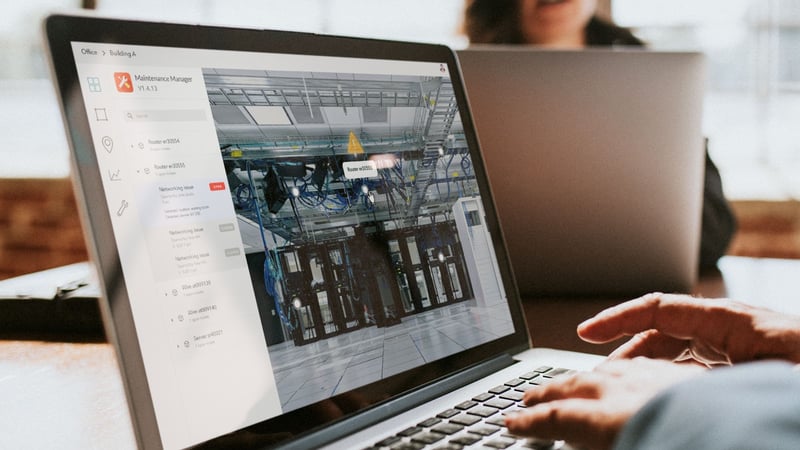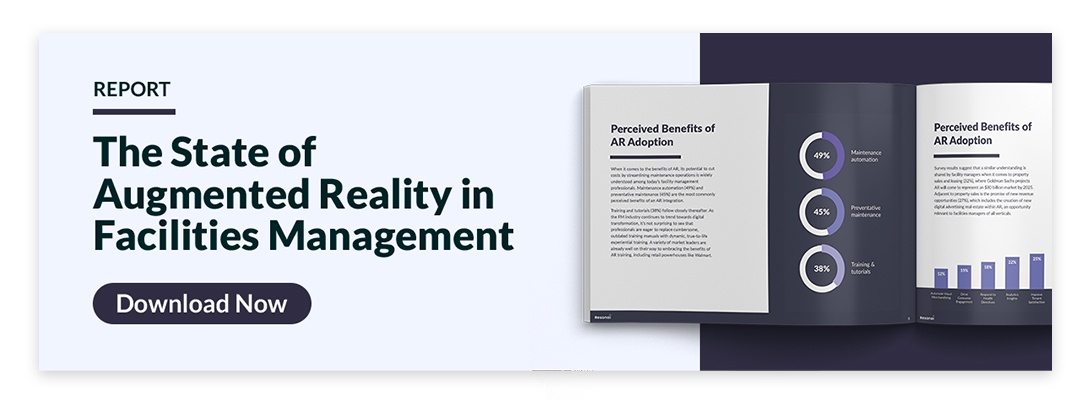Property Maintenance Software: What First-Time Buyers Need to Know
Property maintenance software is a valuable investment that enhances the value of an enterprise’s physical assets.

When enterprises budget for property or equipment, maintenance is just as necessary a consideration as the acquisition itself. It helps facility managers maximize the value of physical assets, ensures their efficient use, and even contributes to employee safety. That’s why modern facilities increasingly invest in property maintenance software that aids in the execution of repairs and upkeep tasks.
This article will define property maintenance software, explore its features, and discuss how it fits into a tech-forward business strategy.
Need a primer of Facilities Management Software? Check out our article, Facilities Management Software: The Essential Guide.
Jump to a section…
What is property maintenance software?
What features should I look for in a software platform?
Going beyond property maintenance
What is property maintenance software?
Property maintenance refers to the overall care and upkeep of a property or installation. The term falls under the purview of facility management or property management, although it is often used interchangeably within those fields.
While property upkeep may sound straightforward, property maintenance is a broad term referring to an exhaustive task list. It covers everything from general repairs to preventative maintenance, although specific objectives vary depending on the facility’s nature. Some common examples include:
- Lawn cutting and snow removal: Seasonal and environmental factors can be a significant part of a building’s regular maintenance. Cutting lawns, removing snow, and other landscaping tasks contribute from a practical and aesthetic perspective to most facilities.
- Safety and hygiene: Personal safety is always a consideration in property maintenance. Equipment and assets must be kept functionally safe as well as operational. In the wake of COVID-19, hygiene is taking on renewed importance, leaving facility managers responsible for implementing sanitization procedures.
- Equipment lifecycle management: Physical spaces are not the only assets that need upkeep — equipment needs periodic repairs as well. Essential equipment must be stored correctly, monitored for wear and tear, and eventually replaced at the end of their life cycle.
- Space utilization and resource allocation: Proper maintenance requires proper storage. Space utilization and resource allocation help minimize clutter across a facility, making it safer for employees and easier to find necessary equipment.
Property maintenance software helps managers organize and complete these interconnected tasks.
What features should I look for in a software platform?
Property maintenance varies from facility to facility; running a warehouse is quite different from managing an apartment building or an office complex. This reality is why property maintenance software must be versatile enough to meet a wide range of enterprise needs. Here are some useful features that facility managers should be on the lookout for:
Building integration
Any building, smart or otherwise, includes various devices, systems, and processes that should operate in tandem with property maintenance software. For example, employees can monitor fire prevention systems that integrate alarms and water sprinkles. Property maintenance integrates these processes into a single location that facility managers can monitor and operate digitally.
User-friendly interface
Maintenance can fall under the purview of many employee roles — facility managers, technicians, and outside contractors can all potentially use the same software platform for daily tasks. In these cases, an intuitive, user-friendly interface is crucial to ensure that the end-user training process runs smoothly. As an additional feature, platforms with machine learning capabilities can analyze integrated data so that all stakeholders can benefit — from facility managers performing preventative maintenance to executives in strategic planning.
Customer service
The last thing any enterprise needs is for the software that supports property maintenance to stop working. For all platforms, customer service options are essential to guarantee a fast solution. Look for options that offer 24-hour service, especially if you run a business that operates day and night.
Work order management
One core feature of property maintenance software is the ability to store and manage on-site work orders. Each platform should be able to track the dates, technicians, progress, and final resolution of each task. Collecting this data in a digital format is ideal: not only does it reduce storage space, but it helps establish historical trend lines. Facility managers can gain an accurate measure of “problem areas” that need addressing while noting any inefficiencies in existing processes.
Energy management
Property maintenance software can simplify and automate energy management by integrating on-site meter readings, temperature readings, and energy usage. Some systems help monitor meters remotely and respond when they reach key thresholds instead of manually checking each one.
Inventory management
While not strictly related to maintenance, inventory management and asset tracking systems are critical for many companies and can keep track of usage data relating to their assets and equipment. When paired with property maintenance software, they let facility managers get a broader picture of all inventory beyond just work orders.
Data reporting and analysis
One of the most beneficial features of property maintenance software is its ability to collate and analyze data relating to every point mentioned above. Many modern platforms can automatically generate reports and highlight historical trends, including usage, service needs and frequency, inventory management and tracking. These tools not only help optimize workflows but can also provide critical information for preventive maintenance and other planning and inform strategic decision making.
Vendor management tools
Facility managers need a centralized location to store all information relating to building systems they control — especially when many are third-party solutions. Staff may need to access manuals, contact information, warranty terms, or other necessary records. Ideally, property maintenance software will include tools for filing manufacturer and vendor-specific documents, such as:
- Manuals: Stores PDFs of third-party assets and equipment for employee training and review.
- Contact: Stores email addresses and phone extensions for on-site managers and technicians, along with customer support contacts for each manufacturer.
- Warranties: Stores warranty dates and manual fields that can be retrieved when unexpected repairs or replacements are necessary.
Going beyond property maintenance
Property maintenance is an essential consideration for any facilities manager, whether you’re managing office space, healthcare facilities, or a shopping mall. At a base level, these processes reduce costs and optimize resources for facility managers. On a deeper level, they unlock advanced capabilities through the use of augmented reality, artificial intelligence, and even digital twins.
At Resonai, our contribution to this space is Vera, a platform that transforms any building into an intelligent digital space for greater operational control and personalized end user experiences. Through Vera Central Control, facilities managers have highly accurate 3D visualization of their entire facility, all devices and people within them. They can access comprehensive real-time data, remotely manage assets and equipment, and launch mobile applications that provide AR experiences within facilities to make technicians more productive and increase tenant satisfaction. Whatever the need, Vera can be customized for individual properties.
If you’d like to learn more, get in touch with Resonai today and set up a free demonstration.
Subscribe to Our Newsletter!
Read More
How to Create a Digital Twin
Digital twins once acted as extensions of IoT technology, but in recent years they’ve become...
What Are Intelligent Buildings? A Beginner’s Guide to Digital Facilities
As technology advances, our physical surroundings are becoming more complex. Any given room can...
Leading Retail Brands Profiting From Experiential AR
As our real and digital worlds become interconnected, augmented reality (AR) proves itself to be...
